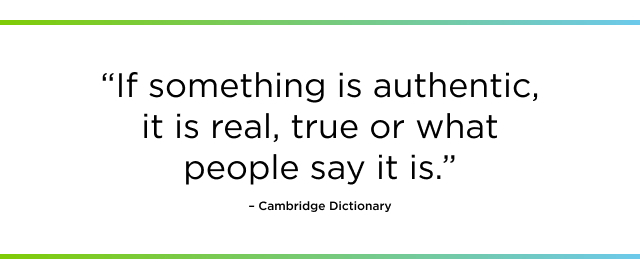In today’s world of AI, bots, deepfakes, and fake news, your B2B buyers are craving authenticity. Be authentic, and they will reward you with their loyalty. In this blog post, we share how to ensure you’re creating authentic content, and how authenticity leads to better marketing performance and customer loyalty.
Why All the Buzz About Authenticity?
It’s no surprise that “authentic” was Merriam Webster’s 2023 word of the year. With rapid adoption of AI, along with increasing skepticism of what’s real or fake on social media channels and news outlets, many are searching for the meaning of “authentic” and what makes an authentic experience.
This growing skepticism is also a challenge for businesses. According to the 2024 Edelman Trust Barometer, 61% of survey respondents felt that businesses “are purposely trying to mislead people by saying things they know are false or gross exaggerations,” a significant increase over 2023. So, what’s a B2B content marketer to do as buyers become more distrustful of business-generated content? The answer: Be authentic.

While authenticity has always been foundational to successful B2B content, we believe that today it’s more critical than ever to give it your full attention to strengthen and preserve the trust you have built with your audiences. According to research from Deloitte, trusted companies outperform their peers by up to 400% in terms of market value. With trust at a premium, authenticity should be at the center of your content marketing strategy.
4 Ways to Ensure that Your Content Is Authentic
When communicating to business decision-makers, remember that you are communicating to humans. They are reading your content, shaping their perception about your brand, and considering your solution to achieve their goals. When creating content, think “H2H” (human to human) instead of “B2B” (“business to business”). Even if “machine customers” become a reality in an AI-dominated future, we believe that there will always be a human involved in the B2B buyer journey. With this in mind, you should follow these four guidelines.
- Put yourself in your audience’s shoes. It’s no longer enough to simply “know” who your audience is. You must go one step further by creating content that is truly unique to their challenges, their opportunities, what keeps them up at night, what motivates them to act, and how they make decisions. Incorporating quality research into your persona development is a great start. But you must also lean into customer/user interviews, case studies, customer feedback, and first-party data. By seeking topics that are both authentic and uniquely relevant, your content will resonate with your B2B buyers and gain their trust.
- Be a storyteller. The days of soulless, jargon-filled business content for generic audiences are over. Business decision-makers have emotions, dreams, and passions. And they love an honest and memorable story (don’t we all?). When creating content, develop a compelling story arc that makes your protagonist the hero as they face challenges that they resolve to achieve a better future for themselves or the greater good. Whether your story is about how your brand makes your customers’ lives easier/simpler/better, or your customers tell their own stories about their positive experience with your brand, storytelling helps you develop an emotional connection with your audience.
- Make human connections IRL. In today’s hybrid and remote work environments, people crave human connections. And a real human touch is required to develop trust. Tapping into industry influencers to share your messages (preferably not AI influencers), hosting a virtual or in-person event, engaging in conversations on LinkedIn, or being an active member in private communities (e.g., Slack, LinkedIn groups), are all effective ways to share your content via interactive platforms. Make these connections an essential element in your content marketing strategy to show that you are who you say you are: a real-life ambassador of your brand.
- Do what you say and say what you do. We can all remember a time when we invested in a product or service based on a brand’s promise of making our lives better or simpler, only to find that it failed to deliver. Nothing kills trust faster than overpromising and underdelivering. B2B purchases often require long sales cycles, involve large buying committees, and are high stakes (sometimes high enough to impact one’s career). With so much on the line, it’s critical to be honest about what your product can do and be transparent about what it can’t do. Avoid “best, first, most, only” language in your messaging unless you can back it up with facts and stats. Elevate your customers’ post-purchase experience with genuine, helpful content that will turn them into your advocates. And if you gate high-value content by requiring your readers to provide their data, make sure your content delivers on that promise.
Boost Marketing Performance with Trusted Content
Authentic content delivers strong performance because your buyers actively seek information from trusted sources to help them make a purchase decision. By paying close attention to content authenticity, you can expect to see:
- Better engagement rates: According to LinkedIn 2024 benchmark data, LinkedIn posts from individuals receive up to 561% more interaction compared to company page posts. Why? People perceive posts from individuals as more authentic and relatable. [Consider launching an employee advocacy program to improve the performance of your LinkedIn campaigns. When employees share stories about their experiences with your company, values, and culture, you will achieve an engagement boost.
- Higher conversions: According to Clutch, 94% of B2B buyers use online review sites to make purchase decisions. They are more likely to make a purchase after reading a trusted review from an individual and prefer to hear product information from other users and customers than from a brand. So lean into this trusted content by sharing social proof and reviews on your website, social posts, emails and anywhere else you want to authentically highlight the amazing experience you provide.
- More influence: Seventy nine percent of B2B buyers consider case studies the most influential content type during the purchasing decision stage, according to the 2023 Demand Gen Content Preferences Survey Report. They trust case studies that are based on a customer’s real-life experience with a brand’s products and how it helped solve their challenges. Prioritize case studies in your content mix to help move prospective buyers from consideration to purchase.
Keep a Human in the Loop
Salesforce’s 2024 State of Marketing Report revealed that 68% of customers “say advances in AI make it more important for companies to be trustworthy.” Content development will evolve rapidly in the coming years as marketers adopt AI platforms and tools to create, edit, and optimize content. Regardless of how you plan to use AI in your content development process, you must keep a human in the loop to ensure that your content maintains brand consistency and authenticity. Your reputation depends on it.
Need Help with Content Creation?
Storytelling is at the heart of what we do at Tendo. We can help you create authentic, and impactful content that resonates with your audiences, builds trust in your brand, and helps you achieve your business goals. Contact us to learn more.









